2023届高考英语二轮语法复习:过去完成时 past perfect tense课件(共23张PPT)
文档属性
| 名称 | 2023届高考英语二轮语法复习:过去完成时 past perfect tense课件(共23张PPT) | 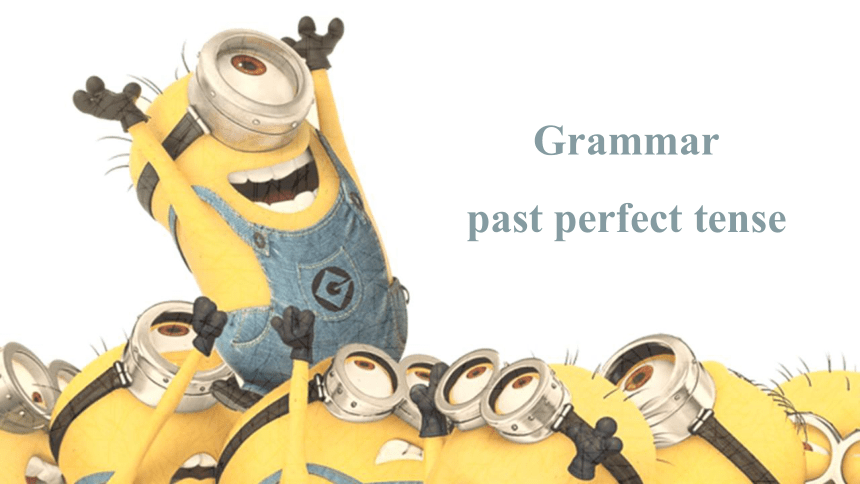 | |
| 格式 | pptx | ||
| 文件大小 | 3.0MB | ||
| 资源类型 | 教案 | ||
| 版本资源 | 通用版 | ||
| 科目 | 英语 | ||
| 更新时间 | 2023-03-13 15:48:28 | ||
图片预览

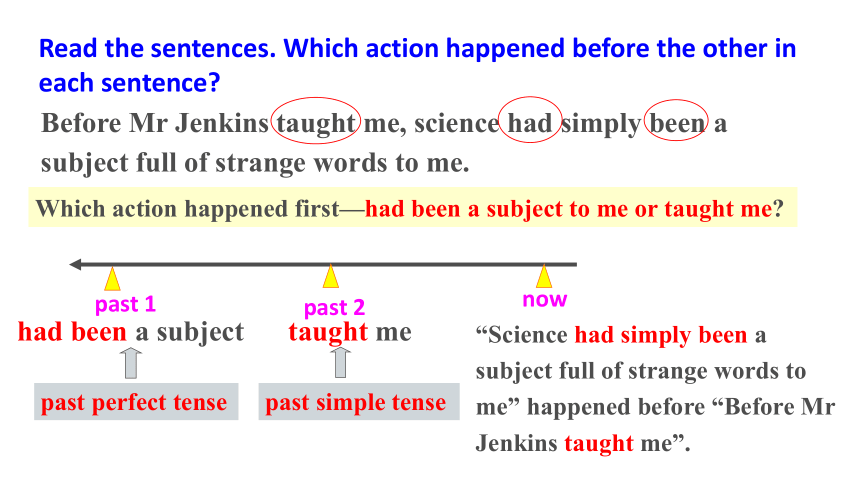
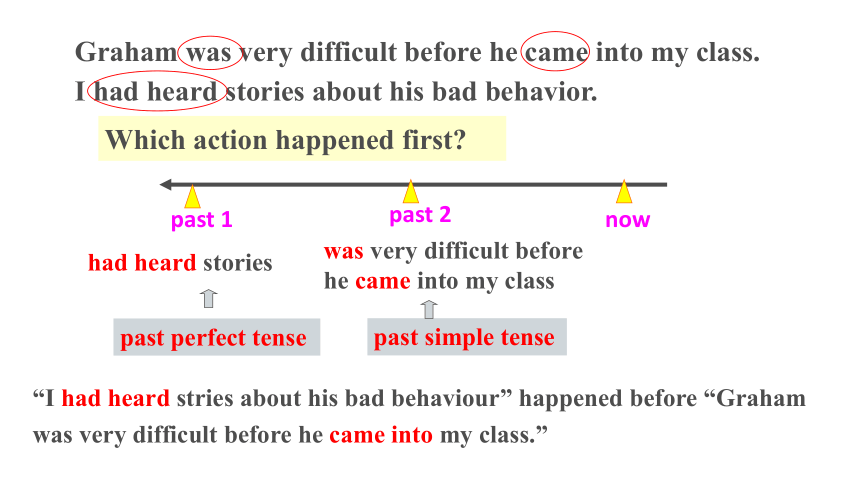

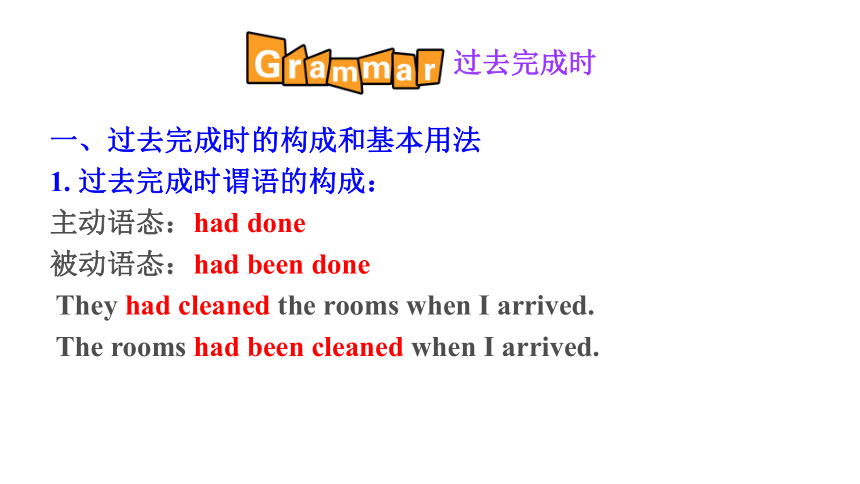
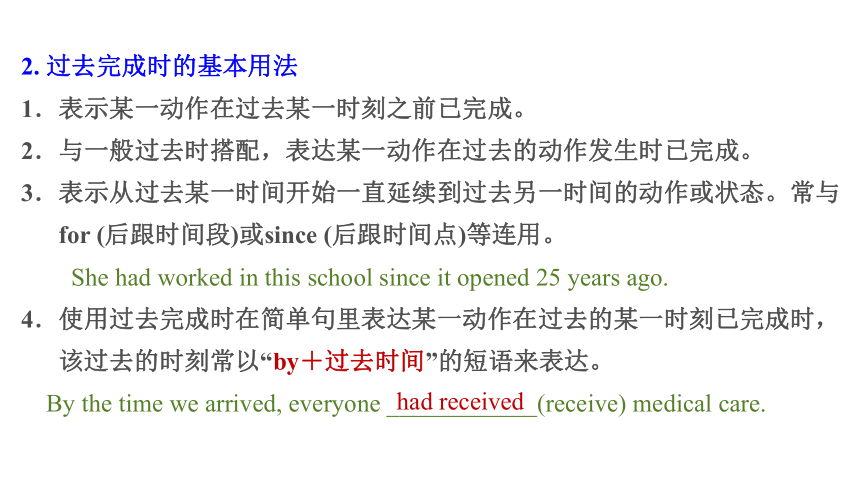
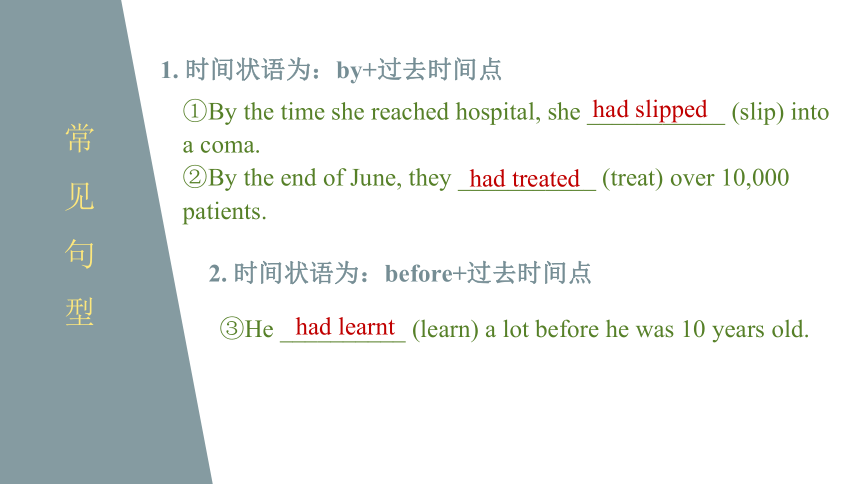
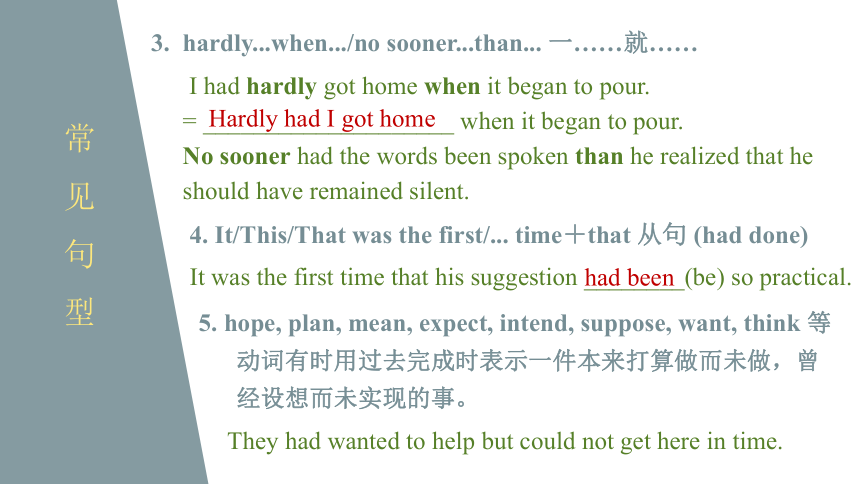
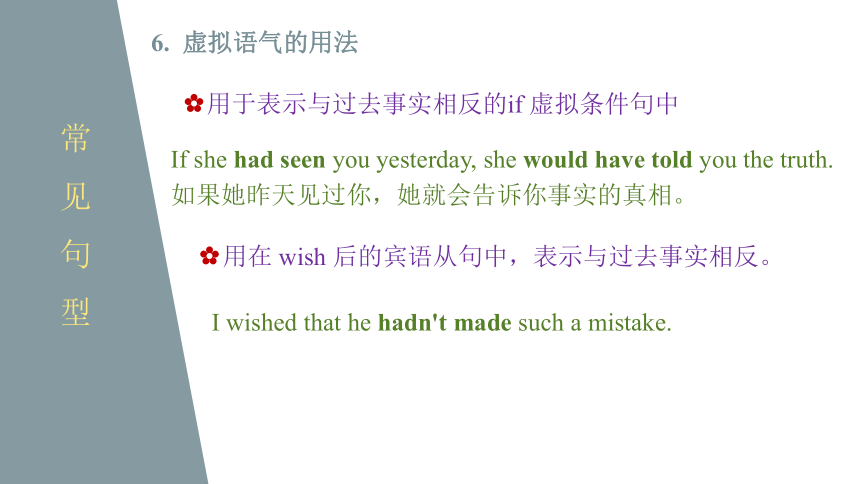
文档简介
(共23张PPT)
Grammar
past perfect tense
now
taught me
had been a subject
past 1
past 2
past perfect tense
past simple tense
Before Mr Jenkins taught me, science had simply been a subject full of strange words to me.
Which action happened first—had been a subject to me or taught me
Read the sentences. Which action happened before the other in each sentence
“Science had simply been a subject full of strange words to me” happened before “Before Mr Jenkins taught me”.
now
was very difficult before he came into my class
had heard stories
past 1
past 2
past perfect tense
past simple tense
Graham was very difficult before he came into my class. I had heard stories about his bad behavior.
Which action happened first
“I had heard stries about his bad behaviour” happened before “Graham was very difficult before he came into my class.”
过去完成时主要用来表示在过去之前发生的事或者动作,“过去的过去”,常有一般过去时作为参照。
now
I knew …
had chosen a job
past 1
past 2
past perfect tense
past simple tense
I knew I had chosen a job with a lot of stress.
Which action happened first
“I had chosen a job with a lot of stress” happened before “I knew”.
一、过去完成时的构成和基本用法
1. 过去完成时谓语的构成:
主动语态:had done
被动语态:had been done
They had cleaned the rooms when I arrived.
The rooms had been cleaned when I arrived.
过去完成时
2. 过去完成时的基本用法
1.表示某一动作在过去某一时刻之前已完成。
2.与一般过去时搭配,表达某一动作在过去的动作发生时已完成。
3.表示从过去某一时间开始一直延续到过去另一时间的动作或状态。常与for (后跟时间段)或since (后跟时间点)等连用。
She had worked in this school since it opened 25 years ago.
4.使用过去完成时在简单句里表达某一动作在过去的某一时刻已完成时,该过去的时刻常以“by+过去时间”的短语来表达。
By the time we arrived, everyone ____________(receive) medical care.
had received
常
见
句
型
1. 时间状语为:by+过去时间点
①By the time she reached hospital, she ___________ (slip) into a coma.
②By the end of June, they ___________ (treat) over 10,000 patients.
had treated
had slipped
2. 时间状语为:before+过去时间点
③He __________ (learn) a lot before he was 10 years old.
had learnt
常
见
句
型
3. hardly...when.../no sooner...than... 一……就……
I had hardly got home when it began to pour.
= ____________________ when it began to pour.
No sooner had the words been spoken than he realized that he should have remained silent.
Hardly had I got home
4. It/This/That was the first/... time+that 从句 (had done)
It was the first time that his suggestion ________(be) so practical.
had been
5. hope, plan, mean, expect, intend, suppose, want, think 等动词有时用过去完成时表示一件本来打算做而未做,曾经设想而未实现的事。
They had wanted to help but could not get here in time.
常
见
句
型
6. 虚拟语气的用法
用于表示与过去事实相反的if 虚拟条件句中
用在 wish 后的宾语从句中,表示与过去事实相反。
If she had seen you yesterday, she would have told you the truth.
如果她昨天见过你,她就会告诉你事实的真相。
I wished that he hadn't made such a mistake.
6:00 (eat up) 7:00 (get up) now
Last Sunday, I had an unlucky day. By the time I _______, my dog ___________ all my breakfast on the table.
got up
had eaten up
9:15
9:35, now
Then I went to see a film with empty stomach. When I _______ at the cinema, the film __________ (be) on for 20 minutes.
arrived
had been
arrive
be on
After the film, I went to meet a friend whom I ___________ (not see) since we __________.
had not seen
graduate
not see
graduated
We had coffee and talked happily. But when I was going to pay for it, I ___________ (find) my wallet and cell phone _____________ (steal). What an unlucky day !
had been stolen
found
1. Before she could express her thanks to us, my daughter gave her the food we __________(buy)for the trip home.
分析:此句有明显的动作发生先后
buy的动作一定是发生在gave her之前,过去某动作之前发生的动作【简称过去的过去】就是过去完成时。
高考真题
had bought
2. I __________(hope) to take a holiday this year but I wasn't able to get away.
分析:此句时态的参考依据为but I wasn’t able to get away【但是我没能离开】理解为讲述过去的真实/现实状况。而hope这个动作必然发生在之前,意为“之前希望/本希望”【暗示事与愿违】
过去完成时态与表达“希望,期望,以为,认为”的词语连用,属于虚拟语气范畴,必定与上下句中的真实状况相反。
高考真题
had hoped
仿写:我本打算和家人一起去露营,结果下雨了。
I had hoped/expected to go camping with my family, but it rained.
练习:单句语法填空
1.I ____________ (finish) half of the work by yesterday.
2.She found that she __________ (leave) her luggage on the bus.
3.She already knew the secret but no one __________ (tell) her.
4.If he _________ (do) otherwise, I should have thought him a bad man.
5.She turned scarlet from embarrassment, once she _________ (realize) what she had done.
had finished
had left
had told
had done
realized
尴尬得满脸通红
辨不同
1. 一般过去时与过去完成时
时态 结构 用法
一般过去时 主动: did/was/were 动作发生在过去的某个时间
被动:was/were done 过去完成时 主动:had done 动作发生在过去的某个时间之前
动作发生在过去的某个动作之前
被动:had been done I finished the work at 5 o'clock.
I had finished the work before 5 o'clock.
我(过去)五点完成了这项工作。
我(过去)五点前,已经完成了这项工作。
2. 过去完成时与现在完成时
时态 结构 用法
现在完成时 主动: have/has done 动作发生在过去的某个时间,但侧重对现在产生的结果或影响
被动:have/has been done 过去完成时 主动:had done 动作发生在过去的某个时间之前
动作发生在过去的某个动作之前
被动:had been done e7d195523061f1c0f0ec610a92cff745ee13794c7b8d98f8E73673273C9E8BE17CC3D63B9B1D6426C348A354AD505654C28F453CD7C8F90EADD06C08281DAED7140E5AAAED5880ECE414DFB6A93B82BE019406867034C3A8500A4827DCF3FBF74A471B736410707E336A01C9ADC9BE02ACCB8DF2121D81636A067B8AE80C6AB6F014154F4E7B7247
now
A
B
I have learned 1,000 English words so far.
I had learned 1,000 English words till then.
到目前为止,我已经学了1000个单词。
到那时为止,我已经学了1000个单词。
Thank you !
Grammar
past perfect tense
now
taught me
had been a subject
past 1
past 2
past perfect tense
past simple tense
Before Mr Jenkins taught me, science had simply been a subject full of strange words to me.
Which action happened first—had been a subject to me or taught me
Read the sentences. Which action happened before the other in each sentence
“Science had simply been a subject full of strange words to me” happened before “Before Mr Jenkins taught me”.
now
was very difficult before he came into my class
had heard stories
past 1
past 2
past perfect tense
past simple tense
Graham was very difficult before he came into my class. I had heard stories about his bad behavior.
Which action happened first
“I had heard stries about his bad behaviour” happened before “Graham was very difficult before he came into my class.”
过去完成时主要用来表示在过去之前发生的事或者动作,“过去的过去”,常有一般过去时作为参照。
now
I knew …
had chosen a job
past 1
past 2
past perfect tense
past simple tense
I knew I had chosen a job with a lot of stress.
Which action happened first
“I had chosen a job with a lot of stress” happened before “I knew”.
一、过去完成时的构成和基本用法
1. 过去完成时谓语的构成:
主动语态:had done
被动语态:had been done
They had cleaned the rooms when I arrived.
The rooms had been cleaned when I arrived.
过去完成时
2. 过去完成时的基本用法
1.表示某一动作在过去某一时刻之前已完成。
2.与一般过去时搭配,表达某一动作在过去的动作发生时已完成。
3.表示从过去某一时间开始一直延续到过去另一时间的动作或状态。常与for (后跟时间段)或since (后跟时间点)等连用。
She had worked in this school since it opened 25 years ago.
4.使用过去完成时在简单句里表达某一动作在过去的某一时刻已完成时,该过去的时刻常以“by+过去时间”的短语来表达。
By the time we arrived, everyone ____________(receive) medical care.
had received
常
见
句
型
1. 时间状语为:by+过去时间点
①By the time she reached hospital, she ___________ (slip) into a coma.
②By the end of June, they ___________ (treat) over 10,000 patients.
had treated
had slipped
2. 时间状语为:before+过去时间点
③He __________ (learn) a lot before he was 10 years old.
had learnt
常
见
句
型
3. hardly...when.../no sooner...than... 一……就……
I had hardly got home when it began to pour.
= ____________________ when it began to pour.
No sooner had the words been spoken than he realized that he should have remained silent.
Hardly had I got home
4. It/This/That was the first/... time+that 从句 (had done)
It was the first time that his suggestion ________(be) so practical.
had been
5. hope, plan, mean, expect, intend, suppose, want, think 等动词有时用过去完成时表示一件本来打算做而未做,曾经设想而未实现的事。
They had wanted to help but could not get here in time.
常
见
句
型
6. 虚拟语气的用法
用于表示与过去事实相反的if 虚拟条件句中
用在 wish 后的宾语从句中,表示与过去事实相反。
If she had seen you yesterday, she would have told you the truth.
如果她昨天见过你,她就会告诉你事实的真相。
I wished that he hadn't made such a mistake.
6:00 (eat up) 7:00 (get up) now
Last Sunday, I had an unlucky day. By the time I _______, my dog ___________ all my breakfast on the table.
got up
had eaten up
9:15
9:35, now
Then I went to see a film with empty stomach. When I _______ at the cinema, the film __________ (be) on for 20 minutes.
arrived
had been
arrive
be on
After the film, I went to meet a friend whom I ___________ (not see) since we __________.
had not seen
graduate
not see
graduated
We had coffee and talked happily. But when I was going to pay for it, I ___________ (find) my wallet and cell phone _____________ (steal). What an unlucky day !
had been stolen
found
1. Before she could express her thanks to us, my daughter gave her the food we __________(buy)for the trip home.
分析:此句有明显的动作发生先后
buy的动作一定是发生在gave her之前,过去某动作之前发生的动作【简称过去的过去】就是过去完成时。
高考真题
had bought
2. I __________(hope) to take a holiday this year but I wasn't able to get away.
分析:此句时态的参考依据为but I wasn’t able to get away【但是我没能离开】理解为讲述过去的真实/现实状况。而hope这个动作必然发生在之前,意为“之前希望/本希望”【暗示事与愿违】
过去完成时态与表达“希望,期望,以为,认为”的词语连用,属于虚拟语气范畴,必定与上下句中的真实状况相反。
高考真题
had hoped
仿写:我本打算和家人一起去露营,结果下雨了。
I had hoped/expected to go camping with my family, but it rained.
练习:单句语法填空
1.I ____________ (finish) half of the work by yesterday.
2.She found that she __________ (leave) her luggage on the bus.
3.She already knew the secret but no one __________ (tell) her.
4.If he _________ (do) otherwise, I should have thought him a bad man.
5.She turned scarlet from embarrassment, once she _________ (realize) what she had done.
had finished
had left
had told
had done
realized
尴尬得满脸通红
辨不同
1. 一般过去时与过去完成时
时态 结构 用法
一般过去时 主动: did/was/were 动作发生在过去的某个时间
被动:was/were done 过去完成时 主动:had done 动作发生在过去的某个时间之前
动作发生在过去的某个动作之前
被动:had been done I finished the work at 5 o'clock.
I had finished the work before 5 o'clock.
我(过去)五点完成了这项工作。
我(过去)五点前,已经完成了这项工作。
2. 过去完成时与现在完成时
时态 结构 用法
现在完成时 主动: have/has done 动作发生在过去的某个时间,但侧重对现在产生的结果或影响
被动:have/has been done 过去完成时 主动:had done 动作发生在过去的某个时间之前
动作发生在过去的某个动作之前
被动:had been done e7d195523061f1c0f0ec610a92cff745ee13794c7b8d98f8E73673273C9E8BE17CC3D63B9B1D6426C348A354AD505654C28F453CD7C8F90EADD06C08281DAED7140E5AAAED5880ECE414DFB6A93B82BE019406867034C3A8500A4827DCF3FBF74A471B736410707E336A01C9ADC9BE02ACCB8DF2121D81636A067B8AE80C6AB6F014154F4E7B7247
now
A
B
I have learned 1,000 English words so far.
I had learned 1,000 English words till then.
到目前为止,我已经学了1000个单词。
到那时为止,我已经学了1000个单词。
Thank you !
